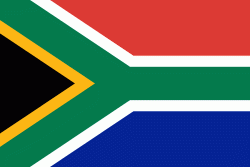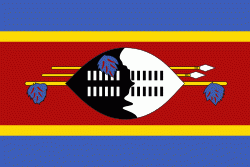Swati language
The Swazi or siSwati language is a Bantu language of the Nguni group spoken in Eswatini and South Africa by the Swati people. The number of speakers is estimated to be in the region of 2.4 million. The language is taught in Eswatini and some South African schools in Mpumalanga, particularly former KaNgwane areas. Siswati is an official language of Eswatini (along with English), and is also one of the eleven official languages of South Africa.
The official term is "siSwati" among native speakers; in English, Zulu, Ndebele or Xhosa it may be referred to as Swazi. Siswati is most closely related to the other Tekela languages, like Phuthi and Northern Transvaal (Sumayela) Ndebele, but is also very close to the Zunda languages: Zulu, Southern Ndebele, Northern Ndebele, and Xhosa.
Siswati spoken in Eswatini can be divided into four dialects corresponding to the four administrative regions of the country: Hhohho, Lubombo, Manzini, and Shiselweni.
Siswati has at least two varieties: the standard, prestige variety spoken mainly in the north, centre and southwest of the country, and a less prestigious variety spoken elsewhere.
In the far south, especially in towns such as Nhlangano and Hlatikhulu, the variety of the language spoken is significantly influenced by isiZulu. Many Swazis (plural emaSwati, singular liSwati), including those in the south who speak this variety, do not regard it as 'proper' Swazi. This is what may be referred to as the second dialect in the country. The sizeable number of Swazi speakers in South Africa (mainly in the Mpumalanga province, and in Soweto) are considered by Eswatini Swazi speakers to speak a non-standard form of the language.
Unlike the variant in the south of Eswatini, the Mpumalanga variety appears to be less influenced by Zulu, and is thus considered closer to standard Swazi. However, this Mpumalanga variety is distinguishable by distinct intonation, and perhaps distinct tone patterns. Intonation patterns (and informal perceptions of 'stress') in Mpumalanga Swazi are often considered discordant to the Swazi ear. This South African variety of Swazi is considered to exhibit influence from other South African languages spoken close to Swazi.
A feature of the standard prestige variety of Swazi (spoken in the north and centre of Eswatini) is the royal style of slow, heavily stressed enunciation, which is anecdotally claimed to have a 'mellifluous' feel to its hearers.
The official term is "siSwati" among native speakers; in English, Zulu, Ndebele or Xhosa it may be referred to as Swazi. Siswati is most closely related to the other Tekela languages, like Phuthi and Northern Transvaal (Sumayela) Ndebele, but is also very close to the Zunda languages: Zulu, Southern Ndebele, Northern Ndebele, and Xhosa.
Siswati spoken in Eswatini can be divided into four dialects corresponding to the four administrative regions of the country: Hhohho, Lubombo, Manzini, and Shiselweni.
Siswati has at least two varieties: the standard, prestige variety spoken mainly in the north, centre and southwest of the country, and a less prestigious variety spoken elsewhere.
In the far south, especially in towns such as Nhlangano and Hlatikhulu, the variety of the language spoken is significantly influenced by isiZulu. Many Swazis (plural emaSwati, singular liSwati), including those in the south who speak this variety, do not regard it as 'proper' Swazi. This is what may be referred to as the second dialect in the country. The sizeable number of Swazi speakers in South Africa (mainly in the Mpumalanga province, and in Soweto) are considered by Eswatini Swazi speakers to speak a non-standard form of the language.
Unlike the variant in the south of Eswatini, the Mpumalanga variety appears to be less influenced by Zulu, and is thus considered closer to standard Swazi. However, this Mpumalanga variety is distinguishable by distinct intonation, and perhaps distinct tone patterns. Intonation patterns (and informal perceptions of 'stress') in Mpumalanga Swazi are often considered discordant to the Swazi ear. This South African variety of Swazi is considered to exhibit influence from other South African languages spoken close to Swazi.
A feature of the standard prestige variety of Swazi (spoken in the north and centre of Eswatini) is the royal style of slow, heavily stressed enunciation, which is anecdotally claimed to have a 'mellifluous' feel to its hearers.
Country
-
South Africa
South Africa, officially the Republic of South Africa (RSA), is the southernmost country in Africa. It is bounded to the south by 2798 km of coastline that stretch along the South Atlantic and Indian Oceans; to the north by the neighbouring countries of Namibia, Botswana, and Zimbabwe; and to the east and northeast by Mozambique and Eswatini. It also completely enclaves the country Lesotho. It is the southernmost country on the mainland of the Old World, and the second-most populous country located entirely south of the equator, after Tanzania. South Africa is a biodiversity hotspot, with unique biomes, plant and animal life. With over 60 million people, the country is the world's 24th-most populous nation and covers an area of 1221037 km2. South Africa has three capital cities, with the executive, judicial and legislative branches of government based in Pretoria, Bloemfontein, and Cape Town respectively. The largest city is Johannesburg.
About 80% of the population are Black South Africans. The remaining population consists of Africa's largest communities of European (White South Africans), Asian (Indian South Africans and Chinese South Africans), and multiracial (Coloured South Africans) ancestry. South Africa is a multiethnic society encompassing a wide variety of cultures, languages, and religions. Its pluralistic makeup is reflected in the constitution's recognition of 11 official languages, the fourth-highest number in the world. According to the 2011 census, the two most spoken first languages are Zulu (22.7%) and Xhosa (16.0%). The two next ones are of European origin: Afrikaans (13.5%) developed from Dutch and serves as the first language of most Coloured and White South Africans; English (9.6%) reflects the legacy of British colonialism and is commonly used in public and commercial life. -
Swaziland
Eswatini (eSwatini ), officially the Kingdom of Eswatini and formerly named Swaziland (officially renamed in 2018), is a landlocked country in Southern Africa. It is bordered by Mozambique to its northeast and South Africa to its north, west, south, and southeast. At no more than 200 km north to south and 130 km east to west, Eswatini is one of the smallest countries in Africa; despite this, its climate and topography are diverse, ranging from a cool and mountainous highveld to a hot and dry lowveld.
The population is composed primarily of ethnic Swazis. The prevalent language is Swazi (siSwati in native form). The Swazis established their kingdom in the mid-18th century under the leadership of Ngwane III. The country and the Swazi take their names from Mswati II, the 19th-century king under whose rule the country was expanded and unified; its boundaries were drawn up in 1881 in the midst of the Scramble for Africa. After the Second Boer War, the kingdom, under the name of Swaziland, was a British high commission territory from 1903 until it regained its full independence on 6 September 1968. In April 2018, the official name was changed from Kingdom of Swaziland to Kingdom of Eswatini, mirroring the name commonly used in Swazi.
